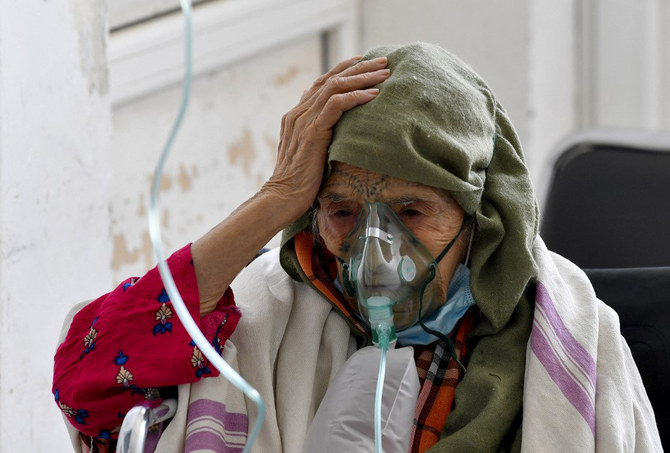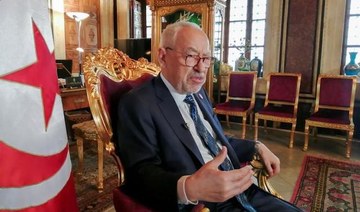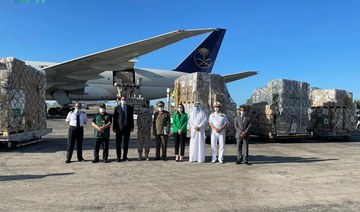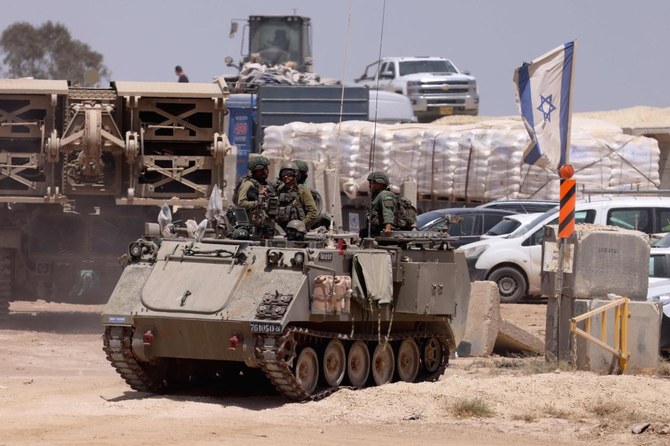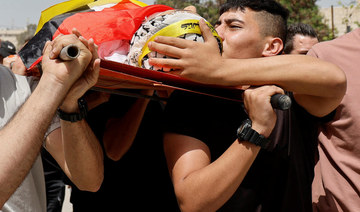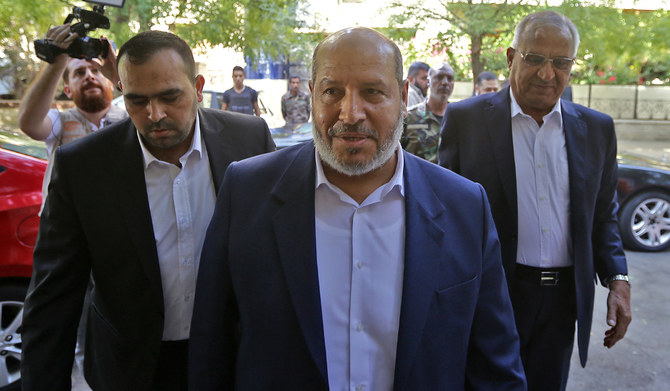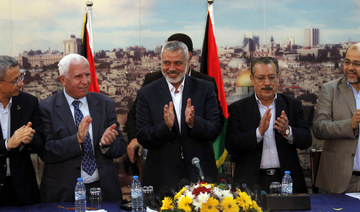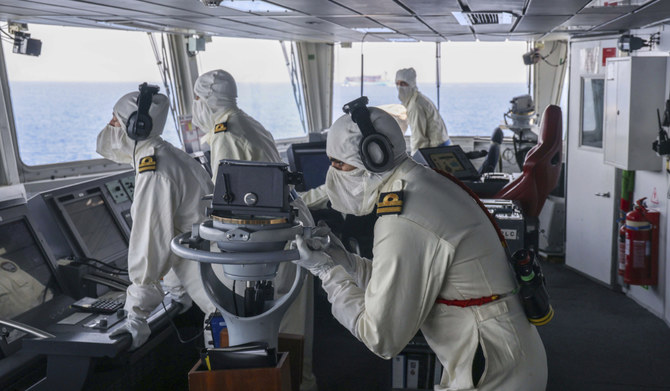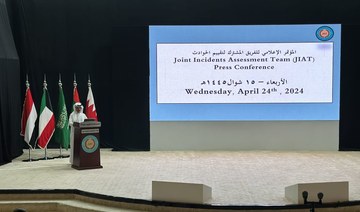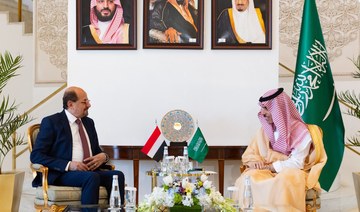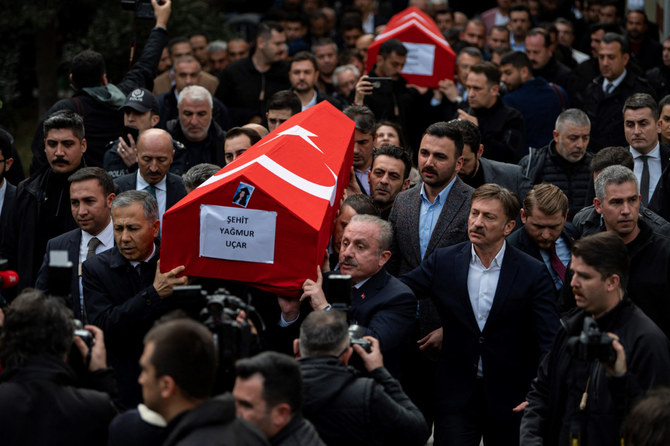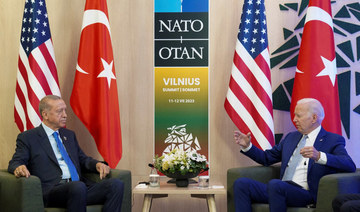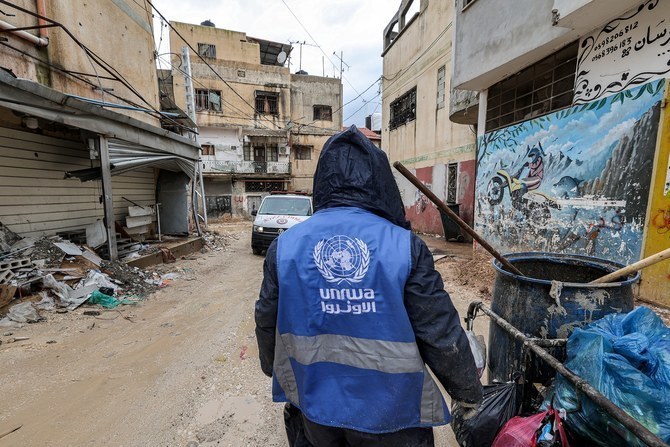DUBAI: Several towns in Tunisia are reporting a severe shortage of oxygen as a third wave of the coronavirus pandemic puts enormous strain on the North African country’s already stretched healthcare system.
Intensive care units (ICU) are almost full, with patient numbers greatly exceeding the number of beds available.
Since mid-April, seven-day averages for new infections in Tunisia have ranged between 1,500 to 2,000 daily cases, and even those numbers are believed to be optimistic. Both the Alpha and Delta variants of COVID-19 — which are more transmissible and potentially more dangerous for younger patients — have been found.
“It is a very concerning situation. If we look at the different indicators, all are in red,” Yves Souteyrand, Tunisia representative of the World Health Organization (WHO), told Arab News.
As in many other countries, the latest surge has put the privileged and the ordinary alike at risk. Reuters reported on Tuesday that Rached Ghannouchi, the 80-year-old speaker of Tunisia’s parliament and the leader of the Islamist Ennahda Party, tested positive for COVID-19. In late June, Prime Minister Hichem Mechichi was reported to have tested positive.
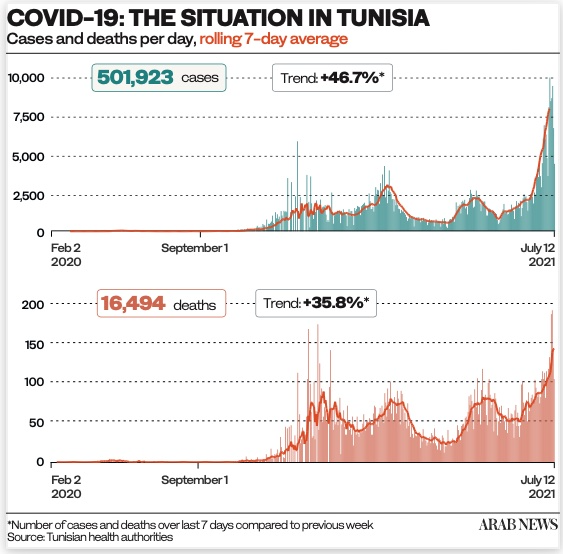
On July 13, the Health Ministry announced 8,470 new cases and 157 additional deaths, increasing the total rate of both to 510,396 and 16,651 respectively since the start of the pandemic.
The number of new cases almost doubled from the day before, and the daily death toll was the highest since the start of the pandemic.
By some metrics, Tunisia now has Africa’s highest per-capita death toll from COVID-19, and is also recording one of the continent’s highest infection rates.
“Tunisia is a country with the highest mortality rate due to COVID-19 since the beginning in the African continent and the Arab world, which is another matter of concern,” Souteyrand said.
Last week, the Health Ministry acknowledged that the situation was dire. “The current situation is catastrophic. The number of cases has risen dramatically. Unfortunately, the health system has collapsed,” spokesperson Nissaf Ben Alya told a local radio station.
Souteyrand concurred with the assessment. “We have a very high level of occupancy rates for oxygen beds and ICU beds. In some governorates the occupancy rate is at 100 percent,” he said.
An impediment to progress in the fight against the virus is Tunisia’s persistent political instability. The country has had three different health ministers since the pandemic first hit. In September, Tunisia got its third government in just under a year — the ninth since the 2011 Arab Spring uprisings ended the 24-year rule of Zine El Abidine Ben Ali.
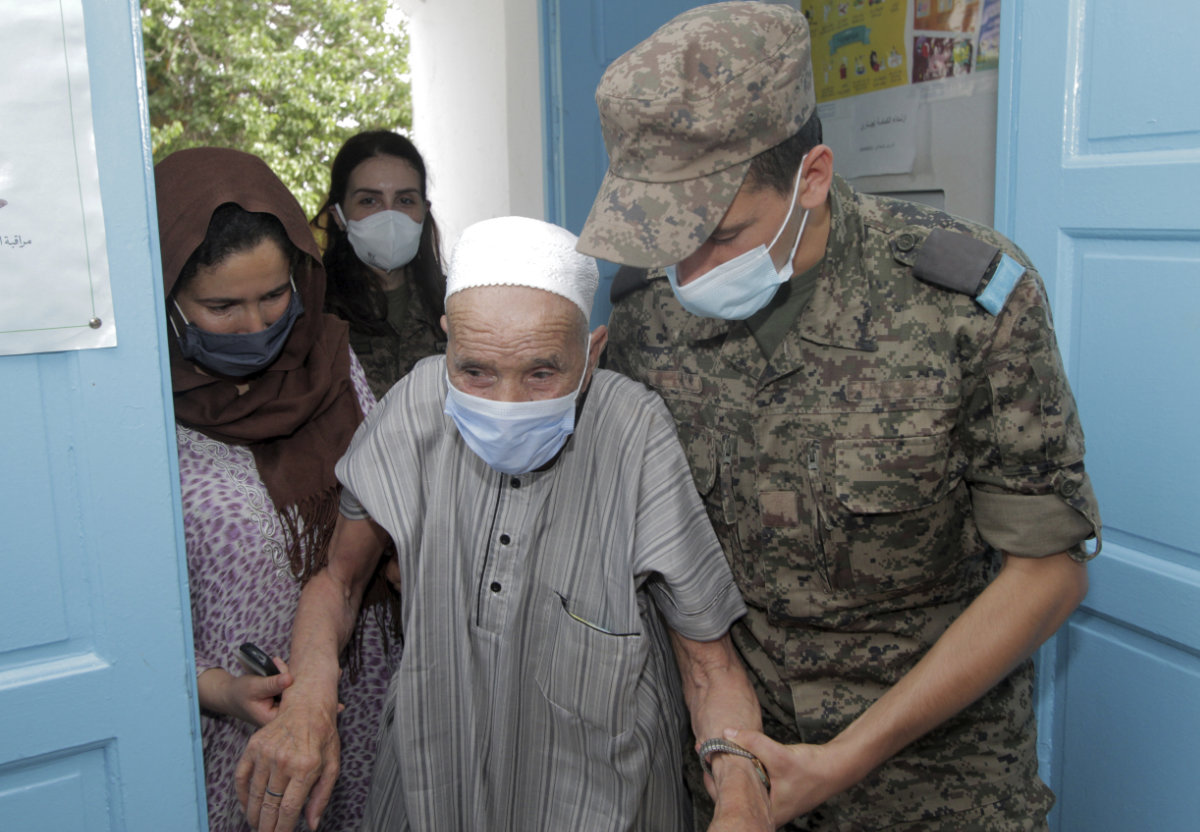
A soldier helps and elderly man to enter the vaccination center in Kesra, Tunisia, on July 13, 2021. (AP Photo/Saber Zidi)
The deteriorating coronavirus situation has prompted an outpouring of support. Most GCC countries have sent medical supplies to Tunisia while Egypt, Algeria and Turkey have pledged to do likewise.
Saudi Arabia has dispatched an aid package consisting of 1 million doses of COVID-19 vaccines, 190 artificial respirators, 319 oxygen tanks, 150 medical beds and 50 vital signs monitoring devices with trolleys. This is in addition to medical masks and gloves, pulse oximeters, intravenous drug pumps, defibrillators, video laryngoscopes and ECG machines.
The Kingdom’s donation was made in response to a request from Tunisian President Kais Saied during a call with Crown Prince Mohammed bin Salman last week.
Separately, a plane carrying 500,000 vaccine doses, donated by the UAE, arrived this week in Tunisia. In November, the UAE sent 11 tons of medical diagnostic equipment, ventilators, mobile breathing units and personal protective equipment .
As worrying as the Tunisian situation may be, Souteyrand says there are several factors to consider when talking about the spike in COVID-19 cases, such as testing rates and the spread of the Delta variant.
“Of course, the increase is related to the huge increase in the number of tests. There is a 62 percent increase in the number of tests in one week,” he told Arab News.
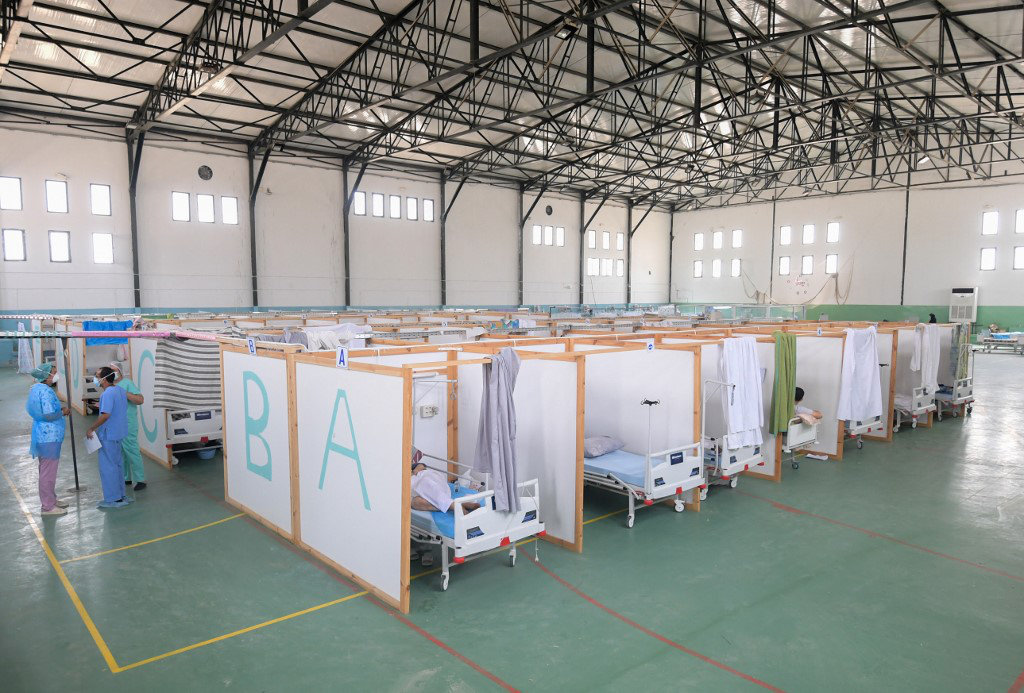
Tunisia was praised for responding to the initial outbreak of COVID-19 with a full-scale lockdown. But a new surge in delta variant cases means hospitals in the country are now being overwhelmed. (AFP)
The rate of positive results compared with the number of tests is nearly 34 percent, “which is very high,” he added.
The Delta variant has been described as a “variant of concern” by the WHO, as it is more contagious and has a higher resistance to antibodies than other variants of the virus.
“The Delta variant is spreading quite broadly in the country. It is probable that the current surge of the epidemic is related to the variant,” Souteyrand said.
“Today it is a race between the Delta variant and the measures that we can implement to move forward in controlling the pandemic.”
According to Souteyrand, transparency of reporting is also an important factor.
“It is possible that Tunisia is being more transparent with us than other countries. It is possible that the high number is also due to the fact that deaths are well reported here,” he said.
Even so, many Tunisians blame the government for the failure to control the situation and the lack of healthcare capacity. Some of them have left angry comments on the Health Ministry’s Facebook page, accusing officials of stealing funds.
In late June Mechichi announced that Sunduq 18-18, created by the government to collect donations for dealing with the pandemic, had received more than $71 million.
“The government is totally absent and there is not enough vaccination. People have collected millions of Tunisian dinars in donations but we haven’t seen anything of it,” Ons Hammadi said.
Vaccination rates in Tunisia lag far behind many other Arab countries. The North African nation only received its first batch of shots around mid-March under the COVAX scheme and the rollout has been slow. As of Tuesday, only 730,000 people had been fully vaccinated out of a total of 11.6 million residents, according to Reuters data.
Tunisia was credited with successfully curbing the first COVID-19 wave with strict regulations and a full lockdown. No new positive test results were reported locally as of May 19 and no imported cases as of June 2.
But that success was not without a downside. Gross domestic product contracted by 8.8 percent in 2020, and 3 percent in the first quarter of 2021 compared with the same period a year ago. The pandemic’s economic impact and rising unemployment have sparked violent demonstrations.
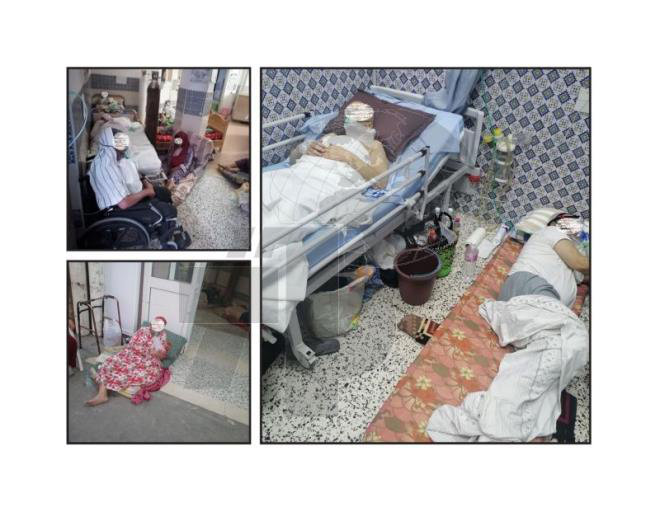
Tunisia was praised for responding to the initial outbreak of COVID-19 with a full-scale lockdown. But a new surge in delta variant cases means hospitals in the country are now being overwhelmed. (AFP)
The government has been understandably reluctant to move back to a full national lockdown.
For many Tunisians, a major cause for concern continues to be perceived lax enforcement of protective rules and violations of regulations. Surveys show that misinformation, vaccine hesitancy and low perceptions of personal risk have compounded the crisis.
“Our curfew is at 8 p.m., yet you can find people at 11 p.m. outside their homes with no masks on,” Salma Al-Khayat, a master’s student, told Arab News.
“We were feeling the effects of the economic downturn, so we waited for summer. The events that take place in this season could have allowed us to let off some steam. But we have ‘curfews’ as well as restrictions on travelling between states. It’s a lot.”
Al-Khayat has asthma, a condition that puts her in the category of people more likely to get severely ill from COVID-19. Naturally, she hopes to see fellow Tunisians become more observant of pandemic rules in the interest of public safety.
“So far, thank God, I have been protected. I observe protective measures and I think so far it has worked for me,” she told Arab News. “But it has been emotionally draining to watch, on the one hand, some people dying from COVID-19 and the economy suffering, and, on the other hand, many people unwilling to make a little sacrifice in their lifestyles.”








